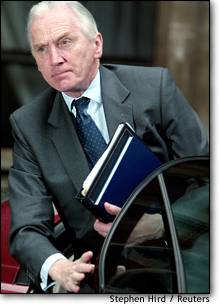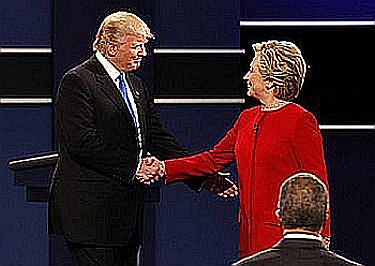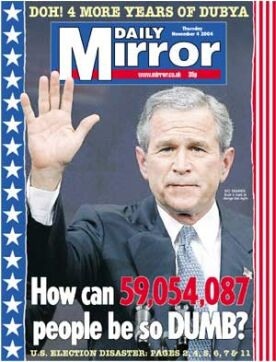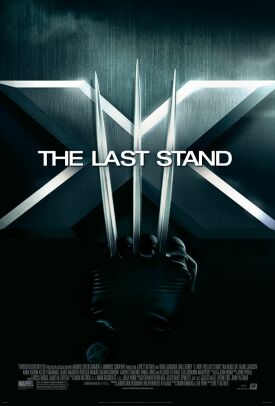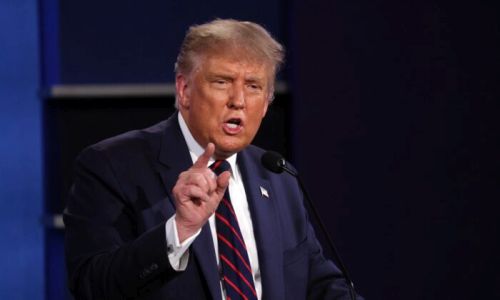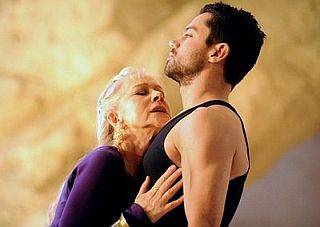Bad Faith, Common Currency
From The New CriterionThey’re b-a-a-a-k! Those horrible weapons of mass destruction may not be much use at destroying people, but they’s still hope for them, in some quarters, as a useful means to the destruction of George W. Bush’s presidency. After a brief lay-off late last year and during the early part of this, in which the media tried out with greater or less enthusiasm other anti-Bush stories, such as the budget deficit, the criticisms of his former treasury secretary, Paul O’Neill — by the way, a prize of five shares of Alcoa stock, no questions asked, to anyone who can explain to me the meaning of the most famous of these, that the President was “like a blind man in a roomful of deaf people” — the alleged arrogance, partisanship or duplicity of the State of the Union address and even a patently absurd allegation that he had gone AWOL during his National Guard service, the media returned in February to its constant theme of last summer and autumn, those famously absent Weapons of Mass Destruction in Iraq. You’ve got to conclude that, as the media sees things, this was the most promising line of attack.
For, as it was becoming increasingly clear, a line of attack was what the media wanted. Even the pretense of objectivity was scarcely bothered with anymore. No sooner had the administration given in to pressure and appointed a panel to investigate the pre-war intelligence about WMD than the outcry became that the President had already politicized the (bi-partisan) commission by instructing it to report only after he runs for re-election in November. “Bush had resisted such a commission until pressure intensified from members of both parties. He called for a report and recommendations by March 31, 2005, which is four months after he faces voters in the general election and two months after he leaves office if not reelected,” as Mike Allen wrote in the Washington Post news story, darkly yet hopefully. Allen’s article on Bush’s naming of the commission is subheaded: “President Concedes Analysis May Have Been Flawed” — just another small contribution by the Post to the journalistic pretense on which all the criticism of Bush was founded, namely that intelligence is ever anything but flawed.
Bush’s agreement to investigate the intelligence services was almost coincidental with the report of Lord Hutton (left), who had been appointed by Tony Blair, the British prime minister, to investigate the death of Dr David Kelly (see “The Wages of Spin” in The New Criterion of October, 2003) and who astonished expectation by severely criticizing the BBC and exonerating the government. In particular, the BBC was censured for the exaggerated and distorted reporting of one of its journalists, Mr Andrew Gilligan, who had notoriously claimed last May that Mr Blair had “sexed up” the intelligence data in order to justify the war in Iraq and, indeed, had “probably” known that some of that data was false when he so used it. Mr Gilligan’s source for this outrageous claim was Dr Kelly, who claimed that his words had been distorted and then killed himself. Lord Hutton had been appointed to investigate his death because of the mighty outcry which ensued blaming the government, and especially Mr Blair’s defense minister, Geoff Hoon, and his political adviser, Alastair Campbell, for conspiring to leak Dr Kelly’s name to the media, so causing the shame which in turn caused him to commit suicide.
The press and the opposition to Blair, both official and unofficial, had been licking their lips with anticipation about the report from a man they regarded as both intelligent and irreproachable as a judge, and they were obviously bitterly disappointed that he had let even Messrs Hoon and Campbell off the hook, and laid the blame entirely on the BBC for sloppy reporting by Mr Gilligan which had then been stoutly and wrongly defended by all Gilligan’s superiors, up to and including the BBC’s director-general, Greg Dyke, and the chairman of its Board of Governors, Gavyn Davies. Both Messrs Dyke and Davies were long-time supporters of Mr Blair who, it was speculated, were keen to show their independence from him. Lord Hutton specifically called attention to the fact that his remit did not include passing judgment one way or the other on the quality of British intelligence about the still-missing weapons. That together with President Bush’s almost-simultaneous agreement to appoint a commission of inquiry into the pre-war intelligence forced the prime minister to appoint one too, this one under Lord Butler, almost as soon as he had been cleared in the matter of Dr Kelly.
To an American looking on, the most remarkable thing about the events in Britain was that Davies, Dyke and Gilligan all promptly — or at least fairly promptly — resigned their positions at the BBC. “There is an honourable tradition in British public life,” said Mr Davies, who was the first of them to go, “that those charged with authority at the top of an organisation should accept responsibility for what happens in that organisation.” And then: “I have been brought up to believe that you cannot choose your own referee and that the referee’s decision is final.” To be sure, it was a moment of graciousness that was swiftly undone as Davies joined Dyke and Gilligan in striking the “We wuz robbed” note, protesting against the injustice of their fate. But from this side of the Atlantic that which makes one rub one’s eyes in disbelief is the idea that the media — the media, for God’s sake! — might be subject to the judgments of a referee in the first place.
Here, of course, the idea that journalists might be answerable to any higher authority would instantly be denounced as an interference with “freedom of the press,” the principle under which our media are able to guard their privileges as both judges and prosecutors — and their own Lord Hutton too if anyone should ever bother to complain. The only lapse or bLtise with the power to embarrass an American media boss comes with the disovery that some prankster has been making up stories. And even then the embarrassment usually only results in elaborate and insincere mea culpas and resignations, if any, that are confined to middle management. Yet there is no shame in being fooled, once, through trusting someone who should be worthy of trust but isn’t. The crocodile tears shed by the New York Times over the Jayson Blair affair last year struck me as having to do with the paper’s overweening sense of its own importance. Certainly you will look in vain for any sense of contrition over the things it should be ashamed of, namely in concealing its biases or, as in the Gilligan case, defending the indefensible for political reasons.
In Britain too, there is furious resentment against among the media at the very idea that the press should be subject to a higher tribunal. It was only the anomalous position of the BBC as a public corporation chartered by the government and financed by a government-mandated levy on the owners of television sets which allowed it to come under Lord Hutton’s purview. Lately the corporation has shown too little interest in preserving its uniqueness, both with regard to programming, which is now all but indistinguishable from that of the commercial networks, and with regard to an unmistakable slant to its reporting of the news, though it has learned the American networks’ trick of denial, insisting that its unrelenting hostility to certain government policies, especially support for the American invasion of Iraq, is merely a symptom of its reporters’ “independence.” At the same time, it is happy to take advantage of that uniqueness as the reason why it should be regarded as more reliable than other media — or, for that matter, the elected government. As the Daily Telegraph editorialized
It is one thing for a tabloid or a Sunday newspaper to indulge in such cavalier behaviour; indeed, it is the very stuff of their trade. But the BBC is not meant to broadcast dubious stories. Precisely because of its unique status, the mere fact of it reporting such an item lends credence where none is due. Rather, the BBC should have a more respectable, trustworthy, public service ethos. This is not a matter of opinion, but of law.
Not that mattered to those who joined in the journalistic outcry that greeted Lord Hutton’s verdict. Left, right and center were virtually unanimous in their disappointment with what Simon Jenkins in The Times called, “the victory of a paranoid court over media criticism.” With only here and there a few dissenting voices, the journalists employed by the privately-owned media leaped to the defense of their colleagues (as they saw them) in the public sector, swiftly proclaiming that the Hutton inquiry — which virtually to a man they had been trumpeting as a model of fairness and objectivity right up until the moment of its report — was a “whitewash.” Public opinion polls were published purporting to show that 56 per cent of the British public thought so too.
Now that kind of poll-taking is utterly useless, as I have argued in these pages before (see “Reporting Innuendo” in the New Criterion of March, 2002). Any time you ask someone if he thinks there is hidden corruption, wrong-doing, or cover-ups in public life, the chances go way up that he will answer in the affirmative if he knows nothing about the matter — because he thinks he’ll look stupid or naVve if he doesn’t, or if he may be deemed to have expressed unquestioning faith in a politician. Everybody knows that politicians are corrupt, self-serving and not to be trusted. The self-interest and corruption of journalists is much less obvious, and there is no question that their power and influence is much enhanced if they are not subject to any Hutton-like higher authority for the accuracy, logic or good sense of what they say or write. Yet in all the media’s criticisms of Lord Hutton there was an underlying sense that it was not quite fair to subject a journalist’s report to the rigorous forensic scrutiny that a high-court judge could give it. It was not quite playing the game that the media’s “free speech” has been reduced to, and a chilling effect might be expected if ever it became customary to look as closely into the things the media say and do as the media expect to look into the things governments say and do.
Gavyn Davies, determined not to be gracious in resignation, could not forbear publicly to ignore the peculiar circumstance which had brought him under official scrutiny and to wrap himself in the cloak of journalistic privilege, asking of Lord Hutton: “Are his conclusions on restricting the use of unverifiable sources in British journalism based on sound law and, if applied, would they constitute a threat to the freedom of the press?” Likewise, Greg Dyke apologised yesterday for Gilligan’s mistake, but he continued to stand up for the gravamen of his report, saying: “Provided his allegations were reported accurately, the public in a modern democracy had a right to be made aware of them. The greater part of the BBC’s coverage of the dossier fulfilled this purpose.” Richard Sambrook, the news director who was the only one of the principals in the Kelly affair not to resign said that “there were things I wish I’d done differently” but that he would not apologize for “supporting a member of staff who was coming under pressure from Downing Street and I have absolutely no regrets about standing up for BBC news as a whole.”
It would be cynical of me to detect a note of disingenuousness in this proud assertion of journalistic independence from government “pressure,” but the tone of the BBC’s coverage of the war in Iraq and its aftermath makes it difficult to imagine that if Tony Blair had taken the line on the war of his fellow European leaders, Messrs Chirac and Schroeder, there would have been any need for demonstrations of such independence. Similarly, on the right the disappointment with Lord Hutton was pretty obviously to do with resentment over Blair’s notching up yet another political victory when defeat had seemed to be so tantalizingly close. “So there he goes again,” wrote Boris Johnson, the Conservative MP and editor of The Spectator. “The cordite is carried off by the breeze. The dust settles and out of the crater creeps the Prime Minister, beaming his chipmunk grin. He acknowledges the cheers of his back benches, flicks an invisible speck from his irreproachable Paul Smith sleeve and saunters off back to Downing Street. It is just flipping unbelievable. He is a mixture of Harry Houdini and a greased piglet. He is barely human in his elusiveness. Nailing Blair is like trying to pin jelly to a wall.”
Rather endearingly, Mr Johnson doesn’t even attempt to disguise his exasperation, or to pretend that it has nothing to do with his accusation of a whitewash. “Hutton has succumbed to blindness of Nelsonian proportions. As snow-jobs go, this beats the Himalayas.” The matter of truth, being unknowable, was just nowhere in most of the discussion of the Hutton report in the British media. Hutton had proclaimed himself to be on the side of the Blairites, so that those who were anti-Blairites, whether in general or over the matter of the war were automatically against him too. Right and left were united in insisting that in essence Gilligan’s report had been accurate and that he had just pushed it a little too far when he claimed on the basis of what turned out to be no evidence at all that the prime minister had deliberately set out to deceive. Likewise, in resigning Gavyn Davies had made reference to the “intemperate attack” on the Corporation by Alastair Campbell. That would be the same Alastair Campbell whom his reporter had accused of lying so as to take the country into war. What was the big deal? Mr Davies appeared to be saying. Why be “intemperate” in one’s response to such a trivial charge — or at least a charge so routinely made by journalists.
Of those commentators whom I read, only Janet Daley, also writing in the Telegraph, seemed to understand that the BBC had simply failed to grasp the seriousness of its own accusation against the government.
This is an imputation of such enormity that anyone making it in the public arena — let alone the most prestigious news-gathering organisation in the world — should have done so only after the most rigorous process of verification. Gilligan’s various (and varying) performances on the Today programme of May 29 are susceptible to easy criticism. They were sloppy, glib and inconsistent with his own (ineptly kept) records.
But loose language from an over-enthusiastic reporter is not such an extraordinary or unforgivable thing in itself. The exigencies of live broadcasting being what they are, these things do happen — usually without tragic consequences. . .No, it was not simply that Gilligan excitedly relayed his snippets of hearsay and office gossip without bothering to stand them up. It was what happened next that raised the real questions about the BBC’s conduct.
In response to a furious complaint from Downing Street (in the person of Alastair Campbell, whom the corporation saw as its nemesis), the entire managerial and governing apparatus of the BBC went to war with the Government. This declaration of open hostility was made proudly and brazenly at the highest levels of the corporation. . . There was a truly breathtaking arrogance, not to say amateurishness, about the way that the BBC refused to relent — or even properly examine — an accusation of such massive contentiousness.
The idea of journalists being “at war” with the government is something that we have ceased to regard as remarkable, as are accusations of mendacity. In war, after all, both lies and accusations of lying are all part of the contest. As Jeremy Paxman, the BBC’s most feared interviewer once put it, in any interview he is constantly asking himself: “Why is this lying bastard lying to me?” Not surprisingly, therefore, the one bit of truth he will never be able to ferret out is that some people, sometimes, are not lying. That such a thing might be possible was what produced the Hutton inquiry in the first place — and Mr Davies’s initial deference to the “referee.” The way he put this was interesting to me, too. That formulation, “I have been brought up to believe” is often used by those who feel obscurely that they ought to adhere to some old-fashioned form of honor — and which form of honor is not old-fashioned? — without quite knowing why. That he was then prepared to criticize Lord Hutton for arriving at the conclusion that he did showed that he could hardly have understood what he was doing in resigning, only that it was expected of him.
Well, it’s a start, like Lord Hutton’s quaintly anachronistic finding that Mr Blair had been guilty of no “dishonourable, duplicitous or underhand” behavior. Those who say they have “been brought up to believe” something are also shifting the onus of belief back onto a previous generation and hence apologizing for continuing to believe themselves. Yet that is itself a form of belief, an unwillingness to cut all one’s ties with the culture of civility that otherwise seems so irrelevant to one’s work as a journalist. It is finally, dare one say it, a manifestation of a kind of pride — perhaps even a perverse pride, perhaps even snobbery — in continuing to belong to the club, as it were, of those who have had such an upbringing. It’s not much, but perhaps it’s enough to give us hope that there still might be a way, if we only knew how to find it, to put an end to the poisonous political “war” culture, in America as in Britain, in which accusations of bad faith have become the common currency.
Discover more from James Bowman
Subscribe to get the latest posts to your email.

